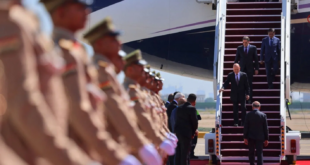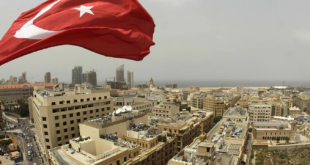Ukraine’s allies are in disagreement on the question of the war.
On June 14, a New York Times report — A Link to Besieged Ukrainians Is Cut, as Allies Question Strategy — said:
“The last bridge to the city of Sievierodonetsk fell as battles raged, and some Western officials questioned Ukraine’s ability to keep resisting Russia.”
The report said:
“Ukraine’s president, Volodymyr Zelensky, insists that his country may yet prevail if it is given more powerful weaponry, but as Western military leaders prepared to meet in Brussels on Wednesday and Thursday, some officials sounded dubious, with talk again turning to what an end to the war might look like — and how to bring it about.”
It added:
Some Western officials say Mr. Zelensky may not have a viable strategy to win the war.
The profession of support notwithstanding, the remarkable initial unity in response to Russia’s invasion seems to be fraying among the Western allies who have shipped weapons to Ukraine and imposed a broad array of financial sanctions on Russia.
Some leaders in Central and Eastern Europe have strong views about the need to teach Russia a painful and lasting lesson — with some going as far as to reject the idea of even speaking to Mr. Putin.
But France, Italy and Germany, among the continent’s biggest and richest countries, are anxious about the prospect of a prolonged, stalemated war that raises the risk of drawing NATO into the fighting and would further damage their economies as they grapple with rising inflation and fuel prices.
The United States has sought to balance two oft-conflicting goals.
Another report said: Ukraine’s allies divided over Russia endgame (Reuters, June 13)
Another report said: It is in the best interests of Ukraine, and the West, to end this war as soon as possible (The Guardian, June 9)
The New Voice of Ukraine in a report — Compromise” peace deals some countries suggest Ukraine should take — said:
While Poland, the UK, the Baltics, and many U.S. politicians insist on enduring and unconditional support of Ukraine, global media outlets keep suggesting that the West is not all that united on this.
French President Emmanuel Macron urging to avoid “humiliating Russia,” to EU Foreign Affairs Chief Josep Borrell saying that the EU will have to find a way to co-exist with Moscow.
Borrell said: “All wars end with ceasefires and negotiations, and it is necessary for Ukraine to enter this phase.”
Borrell also noted that he does not see a way to begin peace talks with Russia at the moment.
Head of the European Commission Ursula von der Leyen and President of the European Parliament Roberta Metsola have ruled out attempts to “appease” Russian dictator Vladimir Putin at this stage.
Speaking at the World Economic Forum in May, former U.S. Secretary of State Henry Kissinger suggested an even less appealing return of the Feb. 24 status-quo.
In its recent article What if Ukraine Wins, Foreign Affairs magazine explored this exact scenario as the more likely shape a Ukrainian victory could take. While the authors think it is unlikely Kyiv manages to liberate Donbas and Crimea entirely, Ukraine could very well push Russian forces from Dnipro’s west bank near Kherson and establish a containment perimeter around Russia-controlled areas in the east and south, and secure access to the Black Sea.
“Over time, Ukrainian forces could move forward, breaking up the land bridge that Russia has established to Crimea, the territory in southeastern Ukraine that Russia seized and annexed back in 2014,” the article reads.
“Essentially, Ukraine could restore the status quo ante that existed before Russia launched its attack in February.”
The New Voice of Ukraine report said:
Another scenario is an immediate ceasefire and peace talks, including potential Ukrainian territorial concessions.
This is the course of action Italy, France, and Germany favor. The governments of these countries have indicated their support for a prompt ceasefire, which would essentially consolidate Russian territorial gains it managed to amass during the last three and a half months.
Ukraine could stand to lose parts of Kherson, Zaporizhzhya, Kharkiv, Donetsk, and Luhansk oblasts – in addition to Crimea and previously-occupied areas of Donbas.
Hungary and Cyprus supported the EU urging Kyiv to immediately cease hostilities and begin negotiations with Moscow.
The Italian plan: ceasefire to maintain the current status quo and attempt to negotiate with Russia.
The Italian government developed a peace plan for the war in Ukraine, which was then sent to the UN and G7. According to the Italian newspaper La República, the document contains the following steps to secure Russian withdrawal from Ukraine:
Ceasefire and a demilitarized zone along the front lines, under UN supervision;
Talks about Ukraine’s future status, including EU membership, but no NATO accession;
Bilateral Ukraine-Russia treaty on Crimea and Donbas. The proposal suggests these “contested territories” be given full autonomy, under nominal Ukrainian sovereignty;
A multilateral European security agreement, which would regulate potential conflicts on the continent and build trust through arms control.Italy suggests an international monitoring group (including Italy, France, Germany, Turkey, the United States, China, Canada, the UK, Poland, and Israel) should oversee the peace process, along with the EU, UN, and other international organizations.
Andrew Michta, Dean of the College of International and Security Studies at the George C. Marshall European Center for Security Studies in Germany, dissected this European approach in a recent article for Politico.
“The rising ceasefire chorus in the West also exposes a paucity of strategic imagination as to what Europe could look like if Kyiv were given sufficient weapons and support to defeat the Russian army in the field,” said Michta.
Macron’s proposal: neither defeat nor victory, as to not “humiliate” Russia
Several French experts and political scientists have suggested that the French president was talking about post-war EU-Russia relations, assuming that “Russia will somehow be defeated.”
The German approach is rather similar. A German government source told Reuters that the team of Chancellor Olaf Scholz was dissatisfied with German Foreign Minister Annalena Baerbock publicly supporting the U.S. policy to “weaken Russia.”
Commenting on Macron’s statement, Borrell said it “reflects reality.”
“Russia will continue to exist even after the peace talks, and we will have to determine how to continue to coexist with it,” Borrell claimed.
Former head of UK MI-6 John Sawers criticizes the French approach to peace with Russia in a recent piece for the Financial Times, titled “Macron is playing a risky game in Ukraine.”
Sawers points out that an immediate ceasefire would simply “lock in” Russian territorial gains in this war.
U.S. Goals In Ukraine, A Pentagon View
Other media reports said:
The U.S. is seeking to make the conflict in Ukraine more costly for Moscow than whatever Russian President Vladimir Putin hoped to achieve, Under Secretary of Defense for Policy Colin Kahl said on Tuesday. Kahl insisted that Russia was making only “tactical” gains in Ukraine and would be unable to achieve its “grandiose objectives” of taking over the entire country, in part thanks to massive U.S. military aid.
“We will continue to provide Ukraine what they need for the fight,” Kahl said on Tuesday, opening a conference organized by the Center for New American Security (CNAS), a Democrat-linked think tank where he used to work.
The Biden administration alone has provided Ukraine with over $5.3 billion in military assistance, of which $4.6 billion has come since February 24, Kahl pointed out.
The U.S. goal is “to make sure that Ukraine can defend itself, that a sovereign independent democratic Ukraine endures, that we give Ukraine the capability to strengthen their position at the bargaining table,” Kahl explained, and to “impose a cost on Russia in excess to whatever benefits Vladimir Putin hopes to achieve through this conflict.”
“Our goal was not regime change in Russia,” Kahl told the CNAS conference.
According to Kahl, Putin “went into this war seeking to gobble Ukraine up. I think he had in his mind envisioned some kind of a thunder run to Kiev to change the regime,” only for the Russian military to be “badly defeated in battle” and thrown back from the Ukrainian capital.
The Pentagon official accused Putin of having “imperial ambitions” and “seeking to reclaim territory that he believes belonged to a glorious past of the Russian Empire.” With Ukrainian troops being “stalwart defenders” and “holding tough,” Kahl said he did not think the Russians would “have the capacity to achieve those grandiose objectives.”
While Russian troops have been making gains in Ukraine, they are “really on any given day measured in blocks” and are “not large, sweeping breakthroughs of Ukrainian defenses,” Kahl insisted. Both Ukrainians and Russians are taking casualties and “the front lines are not moving very much.”
As for when the conflict in Ukraine might end and how, Kahl said the U.S. position “has been we’re not going to tell anybody what to negotiate and when to negotiate.”
“It’s not clear whether the minimum requirements of either side match up with the maximum concessions of the other side,” he said.
According to the Ukrainian media, UK Prime Minister Boris Johnson told Kiev in early April that the West was not willing to make peace with Russia, at which point talks with Moscow stopped.
Kahl was previously the deputy assistant secretary of defense for the Middle East in Barack Obama’s first administration (2009-2011). In 2014, after Washington backed the coup in Kiev and then-Vice President Joe Biden was put in charge of Ukraine policy, Kahl became his national security adviser. He worked at CNAS during the Trump administration, before returning to the Pentagon after a party-line vote in the Senate.
NATO Pledges More Heavy Weapons For Ukraine
Ukraine must get more NATO heavy weapons, the military bloc’s head said on Tuesday, ahead of a meeting of the U.S.-led ‘contact group’ to discuss the logistics of that undertaking. NATO is trying to adapt to the “constantly changing” demands from Kiev, according to the US envoy to the alliance.
“Ukraine should have more heavy weapons and NATO allies and partners have provided heavy weapons and they are also stepping up,” Secretary General Jens Stoltenberg said on Tuesday in The Hague, where he met with leaders of seven member countries ahead of the NATO summit scheduled for the end of June.
“In terms of weaponry, we stand united here that it is crucial for Russia to lose the war,” said Dutch Prime Minister Mark Rutte, who hosted the meeting. “And as we cannot have a direct confrontation between NATO troops and Russia, what we need to do is make sure that Ukraine can fight that war, that it has access to all the necessary weaponry.”
Romanian President Klaus Johannis, Danish Prime Minister Mette Frederiksen, Belgian PM Alexander De Croo, Polish PM Mateusz Morawiecki, Portuguese PM Antonio Costa, and Latvian PM Krisjanis Karins also attended the meeting in the Netherlands.
Stoltenberg previously visited Sweden and Finland, which have applied to join NATO but will most likely not be formally invited to the June 29-30 summit in Madrid, due to Turkish objections.
Meanwhile, U.S. Permanent Representative to NATO Julianne Smith was reported as saying that NATO countries are trying to adapt to Kiev’s demands for additional weapons, which are constantly changing.
According to the Pentagon, initial efforts to supply Ukraine focused on portable anti-tank and anti-aircraft missiles, but are now shifting to tanks and heavy artillery due to the nature of the current fighting in Donbass.
Mikhail Podolyak, adviser to Ukrainian President Volodymyr Zelensky, has said that Kiev urgently needs 1,000 howitzers, 300 multiple-launch rocket systems, 500 tanks, 2,000 armored vehicles, and 1,000 drones.
While the U.S. has pledged only four HIMARS rocket launchers, the Pentagon’s policy chief, Colin Kahl, on Tuesday revealed that they would be supplied with heavy guided missiles, with a range of 70 kilometers.
Mexico Condemns Western Policies On Ukraine
Mexican President Andres Manuel Lopez Obrador has slammed Western countries for their approach to the conflict in Ukraine, suggesting that waves of foreign arms shipments will only result in more bloodshed.
Speaking to reporters at his daily press briefing on Monday, Obrador took a brief aside to address the Ukraine-Russia conflict. While he stopped short of singling out any countries, he said those sending weapons to Kiev – a policy strongly favored by the U.S. and most of its NATO allies – are helping to rack up casualties on all sides.
“How easy it is to say: ‘There I send so much money for weapons, I provide the weapons and you provide the dead.’ It is immoral,” he said, adding “Could not the war in Ukraine have been avoided? Of course. The policy failed and look at the damage it causes, the loss of human lives.”
The president did not elaborate on how the hostilities could have been averted, but went on to say that “the same policy must no longer continue,” claiming it is driven by “elites” and not “the people.”
Mexico has refused to join a Western sanctions spree targeting the Russian economy and has refrained from weapons transfers to the government in Kiev.
The U.S. leads the world in weapons deliveries to Ukraine, providing billions of dollars in heavy and light arms since March, including artillery pieces, multiple-launch rocket systems (MLRS), drones, helicopters, anti-armor and anti-air missiles, among other gear.
Ukraine Needs ‘Customer Support’ For U.S. Weapons, Says Washington Post
Ukrainian fighters are struggling to use some of the weaponry provided by Washington to battle Russian forces, including Javelin anti-tank missiles, because the Pentagon has failed to provide training materials, spare parts and other logistical assistance, The Washington Post reported on Tuesday.
The breakdown stems from an absence of “wartime customer service,” the types of support that U.S. troops rely on to keep their weapons operable, the newspaper said, citing interviews with Ukrainian commanders and Western volunteer fighters. The Post gave the example of Javelin missile launchers that could not be used because of failed electrical components and poor translation of user instructions.
“We are sending equipment,” volunteer trainer Mark Hayward, a U.S. Army veteran, told the media outlet. “But we have decided not to do tech support?”
The Pentagon has sent more than 5,000 Javelin missiles to Kiev as part of Washington’s $54-billion Ukraine aid program. The armor-busting projectiles cost around $78,000 each, and the shoulder-fired launchers are priced at about $178,000, according to the 2021 U.S. defense budget.
The system, made by defense contractors Lockheed Martin and Raytheon, is not only expensive, but also complicated. It comes with a 258-page user manual. The missiles lock on to a target’s thermal image and are guided by computer. They have a range of 2,500 meters.
Hayward said the Javelins sent to Ukraine lack instruction cards directing users to call a toll-free number for help with malfunctions and repairs. U.S. troops have access to such a call center for troubleshooting with their weapons, he added, saying it was unacceptable that President Joe Biden’s administration hasn’t provided such support to Ukrainian fighters.
U.S.-supplied Javelins have been a key tool in the arsenal of Ukrainian forces since Russia launched its military offensive against the former Soviet republic in February. In fact, the Post said the missiles “have come to symbolize US involvement in Ukraine and the race to equip its army for the devastating fight that has unfolded.”
However, in addition to missing troubleshooting cards, the Javelin shipments to Ukraine have lacked computer-based training materials that the U.S. Army “considers fundamental to its training curriculum for the system,” the Post said. Another U.S. Army veteran who is training troops in Ukraine, Bradley Crawford, told the outlet that since his cohort had requested the computer-based program more than a month ago, he hasn’t seen any indication that the kits were delivered.
The issue of logistical support came up in a U.S. Senate hearing last month, when Senator Lisa Murkowski (R-Alaska) noted that Ukraine’s defense intelligence agency had requested more training materials. Asked if enough of them had been sent to Kiev, Defense Secretary Lloyd Austin said the matter had never come up in his discussions with Ukrainian officials. The Pentagon later informed Murkowski’s office that Ukrainian defense officials had confirmed that they had no need for additional training systems, the Post said.
A Ukrainian military officer told the newspaper that his unit had asked for the computer-based programs in late April, a week before Austin’s Senate testimony. The materials still haven’t arrived, he said, and Ukrainian troops are getting less than two days of training on the system. The U.S. Army’s Javelin training course lasts for two weeks, or 80 hours.
“Training is crucial,” the unidentified officer told the Post. “We need to be able to shoot 100% of the targets. We do not have enough Javelins to just get rid of one and pick up another.”
Hayward said the Ukrainians were given a limited supply of batteries for the Javelin launchers. Each battery lasts only four hours on a charge, or less when they’re being fired. Ukrainian forces therefore lock away the batteries for use in combat, so they aren’t available for training. The U.S. Army veteran told Murkowski of how motorcycle batteries, duct tape and wiring were rigged to keep the launchers going during training.
“There has got to be a better way,” Murkowski said. “We can’t send them this sophisticated weaponry and not give them the appropriate resources for training.”
Some European Factories Are Being Forced To Shut Down Due To Soaring Energy Prices
Some European factories have shut down due to soaring global energy prices and insecurity over Russian gas supplies.
The Wall Street Journal reported the news.
High energy costs, caused in part by the Russia-Ukraine war, are making it hard for European factories to compete with countries where energy prices are lower. Natural gas is three times more expensive in Europe than in the U.S., per the WSJ.
Energy-intensive industries such as steel, chemical, and fertilizer manufacturing are shutting their European factories amid rising costs and concerns that Russia may cut off its supply, per the WSJ.
Europe has been preparing to ration gas if Russian supplies are cut off. Finland, Bulgaria, and Poland already had their supply of Russian gas cut off by state-owned company Gazprom PJSC after the countries refused to pay for gas in rubles.
Much of Europe’s industry is reliant on cheap Russian oil and natural gas. Europe was responsible for 50% 0f Russia’s crude oil exports and 75% of its natural gas exports in 2021. In the first two months of the Ukraine war, the EU accounted for 70% of the country’s exports.
U.S. To Sell Up To 45 Million bbls Oil From Reserve As Part Of Historic Release
A Reuters report said:
The U.S. Department of Energy on Tuesday said it was selling up to 45 million barrels of oil from the Strategic Petroleum Reserve as part of the Biden administration’s previously announced, largest-ever release from the stockpile.
Deliveries of crude from the SPR sale would take place from Aug. 16 through Sept. 30, the Energy Department said.
The release was meant to help control oil prices that spiked after Russia, one of the world’s top petroleum producers, invaded Ukraine and as the West imposes sanctions on Moscow.
Biden administration officials have said the oil price could be higher if the SPR had not been tapped. But the release has also driven the level of the reserve to the lowest point since 1987, adding to worries about tight global oil markets despite the U.S. having more in the stockpile than required under international agreements.
Oil contracts from a previous SPR sale announced on May 24 were awarded to nine companies, including Valero, Exxon Mobil and Marathon Petroleum, the Energy Department said.
 Eurasia Press & News
Eurasia Press & News




